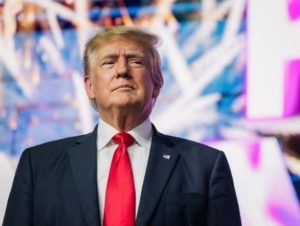Does Trump Now Represent the Republican Establishment?

Just last week, the narrative was starting to write itself on the political left and big corporate media. After a candidate endorsed by Donald Trump narrowly lost – gasp – in a GOP congressional primary in Texas, they were teeing up the argument that Trump is losing touch, losing his appeal, losing his grip on the Republican Party.
But that particular line of wishful thinking was stopped dead in its tracks after an opposite – and deeply revealing – outcome in the heartland. It was like a time warp from the 2016 Republican presidential primary, when Donald Trump took on a field of the best and brightest the GOP had to offer and wiped them all out. This time, it was in a congressional primary in Ohio, where another enormous field of experienced, better-known politicians was routed by a novice candidate bearing a single credential: the endorsement of the 45th president.
Indeed, Mike Carey was a virtually unknown energy lobbyist until Trump stepped in, endorsed him, and invited him on stage at a rally well outside his own district. Carey captured 37% of the vote. None of his ten competitors, including four current or past members of the Ohio state legislature, exceeded 13%.
In his victory statement, Carey well reflected the dominant view of the GOP rank and file circa 2021: “Tonight, Republicans across Ohio’s 15th Congressional District sent a clear message to the nation that President Donald J. Trump is, without a doubt, the leader of our party … I am proud to deliver this win to advance his America First agenda.”
Indeed, even after leaving the White House, Trump remains as a giant, all-consuming shadow looming over the GOP. Most every Republican holding or seeking office is careful to throw bouquets his way and fearful of criticizing the former president, well aware opposing him has proven to be a bad career move. Ask Congresswoman Liz Cheney (R-WY), who’s now headed for defeat, or Jeff Flake, the former senator from Arizona scared to run again after going full Never-Trump, or the raft of establishment candidates brought low by Trump’s active support of MAGA-friendly opponents.
So, for better or worse, it is now time to ask a question long considered unthinkable. But here we go with the e-word. Sensitive souls, skip to the next paragraph. Does Donald Trump represent the new Republican party establishment?
Hold on there, skippy, you may well say. There is nothing “establishment” about this 45th president. Rep. Kevin McCarthy (R-CA), Sens. Mitch McConnell (R-KY) and Lindsey Graham (R-SC), they’re the establishment – and ol’ Mitch and the Donald are no longer even on speaking terms. On paper, that’s true. But what effective power over policy will that fading triumvirate and fellow careerists retain if a MAGA-dominated GOP takes control of the House and/or Senate next year?
Given the free time he has unwillingly been granted, with no race of his own to run, but certain to lay the groundwork for a potential campaign in 2024, Trump will undoubtedly ramp up his involvement in the midterms – a lot. The America First winners he endorses will populate the GOP for a fourth straight election, further diluting the collapsing remnant of the Bush 43/McCain/Romney years.

Donald Trump
(Photo by Brandon Bell/Getty Images)
As a candidate, a president, and now ex-president, Trump continues to redefine politics. Former commanders in chief, particularly those who lost their bids for re-election, have rarely exerted this level of effective control over their party in the modern era. Since the early 20th century, only Ronald Reagan continued to cast a commanding shadow over his party after leaving office, but then only by force of his ideas. Trump is inserting himself directly and forcefully into the 2021 campaign for Governor of Virginia and the 2022 midterms. Will we see that influence countered by the McConnell/Cheney “wing” of the party? Don’t hold your breath.
Remember, insurgents and rebels who succeed eventually become proprietors of the systems they seek to conquer. Trump grabbed center stage more than six years ago, and he never let go through his historic takedown of the Bush and Clinton dynasties, four years in the White House, and his demonstrable, outsized popularity in the aftermath, even in the face of the ugliness surrounding his departure. What matters right now is that he has all but eliminated effective opposition in his own party. By that measure alone, is it not time to call Donald Trump and the America First movement the new Republican establishment?
The post Does Trump Now Represent the Republican Establishment? was first published by Liberty Nation, and is republished here with permission. Please support their efforts.



